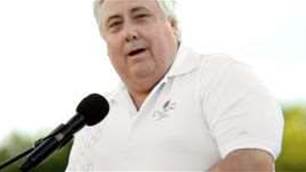Americans John Daly, Payne Stewart and Fred Couples celebrate a team victory in the Dunhill event. A similar format should be used at the Olympics.
 Americans John Daly, Payne Stewart and Fred Couples celebrate a team victory in the Dunhill event. A similar format should be used at the Olympics.
Americans John Daly, Payne Stewart and Fred Couples celebrate a team victory in the Dunhill event. A similar format should be used at the Olympics.THE Olympics was a magnificent spectacle. For two weeks, London gave the world something to talk about with a seemingly endless supply of enthralling sporting moments, which were bookended by spectacular ‘at no expense’ ceremonies. As good as Sydney?
Maybe not, but I could be biased.
In four years’ time, in Rio de Janeiro, golf will rejoin the Olympic family for the first time since 1904 in St Louis. And not everyone agrees that it should be there.
“I don’t agree that golf should be in the Olympics. It’s like the tennis, who even knows who won the gold medal in the tennis?” says Brendan Jones, who has represented Australia as an amateur in the Eisenhower Trophy and a professional in the World Cup.
“These guys are playing every week for millions of dollars and an Olympic gold medal in their house isn’t going to take pride of place,” he adds.
Greg Norman, on the other hand, has been one of the most vocal supporters of golf’s return to the Olympics. He can recall discussing the idea with Seve Ballesteros during a practice round at the World Match Play in 1984. The Spaniard wanted Norman to help him promote the concept of getting golf into the Olympics.
“And here we are today, talking about golf in the Olympics,” Norman said recently. “You know what I love about the Olympics? If you win a bronze medal, you are a hero. If you finish third in a golf tournament, you are a choker.
“That’s what we should all take away from the Olympics.”
Golf’s inclusion on the world’s biggest sporting stage by the International Olympic Committee (IOC) came after years of lobbying by the International Golf Federation (IGF). But the seed of thought had already been planted by Ballesteros, who was friends with Juan Antonio Samaranch, the then-IOC President and a fellow Spaniard. Norman says Seve suggested the idea to Samaranch many times over the years.
And now golf is back in the Olympic fold and the IGF is ecstatic at the prospect of golf being embraced by even more people around the world.
But for golf to make a truly international impact at the Olympics it needs to be different. If golf goes down the same path as tennis, where the format is no different to a regular tournament, it will be lost in the sea of events taking place during the two weeks of Olympic competition.
Considering a lot of golfers, and the public in general, already have their doubts about golf being an Olympic sport, the IGF needs to look at other formats of play, rather than individual 72-hole stroke play. This needs to happen to distinguish this event as being different from normal Tour events and to ignite worldwide interest in the game.
R&A chief executive Peter Dawson said the IGF planned to take another look at the format but when it put together its proposal for the IOC, the format was for 72 holes of stroke play, with medals awarded only to individuals.
He believes that a standard 72-hole event of stroke play is the best way to determine a champion, though the idea of an element of match play, or a team competition, has been raised and “it’s those areas we’ll be having a look at”.
“I think we all had this at the back of our mind at the start, ‘Wouldn’t it be nice to make the Olympic competition a little bit different, at least from the week in, week out competition?’” Dawson said.
If golf at the Olympics is simply a 72-hole stroke event for men and women it will be a huge blunder, especially when you consider long-established major events for men and women will be played just before and after the Olympics that year. How will the Olympic golf be any different? It won’t. How will that attract new people to the sport? It won’t.
Competing at the Olympics is about representing your country. Olympic golf needs a team format of competition run alongside an individual event.
I would love to see the Olympic golf competition run on a format like the now defunct Dunhill Nation’s Cup, which was played from 1985 until 2000. The event featured teams of three players from 16 countries. Each three-man team played one-on-one matches against other teams in a group pool with players pitted against each other in a medal play format – lowest score over the 18 holes got a point for their team. Best placed teams go through to the finals, and so on, to find the winning team.
If this format was adopted for the Olympics, an individual competition could be incorporated. Individual medals would go to the player with the lowest scoring average based on total strokes, divided by rounds played. The player with the lowest average score based on most number of rounds played would win the individual gold medal.
Personally, I think this format would certainly grab the interest of more people who would not normally watch a golf tournament. It would, to some extent, ride the coat-tails of national pride so often seen in team events like the Ryder Cup but rarely seen in majors or other big championships where the player is his own man.
Speaking of major championships, the PGA Championship provided an interesting week of golf and well done to Rory McIlroy for winning his second grand slam title.
But how much longer can the PGA survive as golf’s ‘fourth major’? There is always a sense of anticipation and excitement on the eve of the other three majors but, to me, the PGA feels and looks just like another tour event. I mean, how dissimilar was this year’s PGA to the Memorial, Bay Hill or even the Players Championship, which is often tagged as golf’s ‘fifth major’?
I think this growing chasm of significance between the PGA and the other majors has a lot to do with the choice of venue. The PGA often chooses courses that are willing to pay for the privilege of hosting the championship, rather than taking the event to classic, well-designed layouts that have a history of hosting major championships.
Personally, I think the sooner the PGA of America realises it needs to make a radical change to its flagship event the better. Why not take the PGA Championship global, returning to the United States every four years? The event would then be embraced worldwide and there is no danger of players not turning up because it is a major.
The PGA of America, which has the mantra ‘One World, One PGA’, has a great opportunity to do what the other majors can’t – globally promote the game at the highest level by taking their championship to an international audience.
WHAT DO YOU THINK?
Will golf succeed at the Olympics? What format would you like to see played at the Olympics? Does the PGA Championship need to go global to survive? Let me know your thoughts via email on golf@golfaustralia.com.au or simply leave your comment below.
Related Articles

Palmer Has Titantic Opportunity

Tossing Bricks & Bouquets













